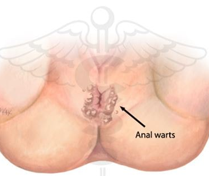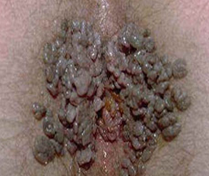INTRODUCTION
Anal warts (condyloma acuminata) most common sexually transmitted disease (STD). The warts affect the area around and inside the anus, but may also develop on the skin of the genital area. They first appear as tiny spots or growths, often as small as a pin head.
When to meet Proctologist / Doctor?
In most cases, the warts don’t cause discomfort or pain. However, they can become irritating if they grow large enough, and might itch or bleed. If no symptoms occur, people with anal warts may not even know they have them
CAUSES OF ANAL WARTS
- Warts are caused by the human papilloma virus (HPV), which is transmitted from person to person by direct contact. HPV is considered to be the most common sexually transmitted disease (STD).
- It is important to note that anal intercourse is not necessary to develop anal condylomata. Any contact exposure to the anal area (hand contact, secretions from a sexual partner) can result in HPV infection.
- Although patients was potentially sensitive and difficult to talk about history of anal intercourse, most prone peoples are Diabetic or positive HIV and who has chronically weakened immune system.
WHAT TO DO FOR DIAGNOSE?
- Proctologist will do Physical examination and focus primarily on the anorectal examination and evaluation of the perineum (pelvic region) that includes the penile or vaginal area to look for warts.
- Digital rectal examination should be performed to rule out any mass. Ano proctoscopy is typically performed to look within the anal canal for additional warts. This involves inserting a small instrument about the size of a finger into anus to help visualize the area.
- Speculum examination may also be performed to aid in vaginal examination in women.
- If they are not removed, the warts usually grow larger and multiply. Left untreated, warts may lead to an increased risk of anal cancer in the affected area.
WHAT IS THE TREATMENT OF WARTS?
- If they are not removed, the warts usually grow larger and multiply. Left untreated, warts may lead to an increased risk of anal cancer in the affected area.
- But for thick and larger size warts surgical excision should done with suitable anaesthesia.




